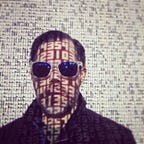Frankenstein AI: a monster made by many
“It is true, we shall be monsters, cut off from all the world; but on that account we shall be more attached to one another.”
― Mary Shelley, Frankenstein
I’m so excited about Frankenstein AI I can barely contain myself. Last week at the Film Society of Lincoln Center we launched a prototype for Frankenstein AI, our newest immersive adaption. Over the next two years we’ll examine the themes within Shelley’s groundbreaking work, using them as a lens to explore our relationship to emergent technologies such as; artificial intelligence, robotics and the Internet of Things.
It’s gonna break
As people filtered into the auditorium I felt butterflies in my stomach. Nick Fortugno and I had gone over the plan for the prototype earlier in the day. We both expected the experience to break at numerous points, so I started the evening by stating that what we were attempting to do could fail at any time.
The questions driving our experimentation were total unknowns. Would a group of strangers be able to come together and educate an AI chatbot in 60 minutes? Would it be possible for participants to share emotions, memories, fears and hopes with a machine in a way that might fuel a compelling narrative?
A Monster Made of Many
In launching Frankenstein AI, we’re working to build on the legacy of our first immersive adaptation Sherlock Holmes & the Internet of Things. At the Columbia University School of the Arts’ Digital Storytelling Lab, we explore new forms and functions of storytelling. In 2014, we launched Sherlock Holmes & the Internet of Things and over the course of the past 2 1/2 years, the program has grown to include over 2,500 collaborators from 60 countries. To date over a 150 self-organized events have been staged around the world. Storytellers, game designers, hackers, makers and students have gathered monthly to challenge the authorship and ownership of stories, while also examining the ethical and political implications of emergent technology.
Sherlock Holmes & the Internet of Things has surfaced so many wonderful insights over the course of its life to date. From methodology to design principles to gaining an understanding of how to build dynamic learning & doing environments on a global scale, the program helped to ignite the imaginations of many. At our launch event for Frankenstein AI, all of those elements were at play. However, one thing was very different. Starting with AI — a technology that’s ubiquitous and adaptive — is quite different than a program like Sherlock that depends on hacking hardware. So, this time with Frankenstein AI, from the moment we started, everyone was interacting with the technology. As a result the room transformed into a playground, and the AI chatbot became a creative collaborator.
A Mirror for Humanity
The themes at work within Shelley’s novel are strong and relevant — especially so today. The rapid acceleration of AI, machine learning, and robotics are starting to challenge the way we live, work and learn.
The notion of harnessing Shelley’s Frankenstein as a way to understand the implications of AI is like holding a mirror up to humanity.
This energy was palpable in the room as the group quickly began to bond, and in the process, transformed the space into one of creativity and empathy. Perhaps this rapid connection was due to the challenging times we find ourselves in, or maybe people simply need and want to connect in more meaningful ways. Yet another factor could be that Shelley herself had such an interesting, eventful, and relatable story that participants were inspired to collaborate. We began the evening with a special talk from Robert Horton, film critic and author of Frankenstein (Columbia Press/Wallflower 2014). Horton provided context on the author and her creation that resonated in a way that felt timeless.
Horton’s insight on the topic of Frankenstein from novel to films to the stage to breakfast cereal was wonderful. His perspective provided a much needed context, and as I interviewed him we drilled deeper into Shelley’s work, life, as well as her exploration into the emergent technologies of her times.
The themes of Shelley’s work echoed throughout the evening. Together the group worked to birth something collaboratively — experiencing the results as they came back through a wonderful feedback loop that resembled a “monster” emerging from a deep slumber.
As the participants shared memories, emotions, fears and hopes, something unexpected happened. Humanity began to surface as philosophical conversations emerged. All at once I was struck by the fact that the AI, instead of invoking dystopian themes, inspired a narrative of hope. The tension between human and machine insight faded and what emerged was a creative storytelling exchange with an AI. At the close of the evening, participants shared that they felt closer to the chatbot due to the fact that they could see themselves within it.
I’m still compiling the takeaways from the evening and will share them in detail soon. But suffice to say the the feeling in the room that night has given birth to something wonderful. The next stop for Frankenstein AI is a special pop-up with the Future of Storytelling at SXSW, where we’ll make some adjustments and return to our experiment once again.
We’ve unleashed a monster, and where it will go — only time will tell.
To be continued…
About Columbia DSL
Frankenstein AI is a prototype from the Columbia University School of the Arts’ Digital Storytelling Lab. We’re pleased to be partnering with the Film Society of Lincoln Center on this exciting multi-year program. If you happen to be in NYC or surrounding area make sure to join our monthly meetup group. Also if you’re interested in connecting with other storytellers, game designers, hackers, makers, educators and fans of emerging technology we’ve just started a Columbia DSL community. Finally if you like to partner with us we’re always up for a good collaboration!
